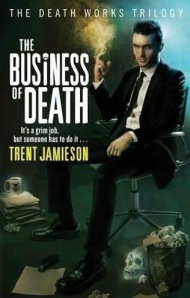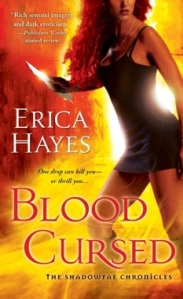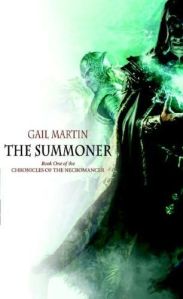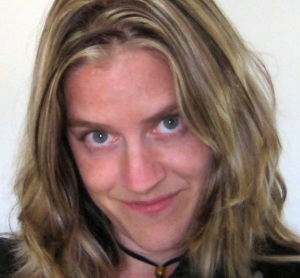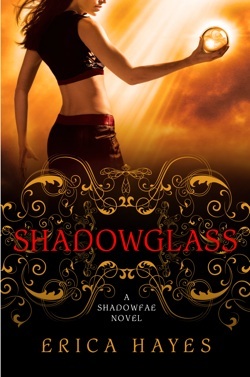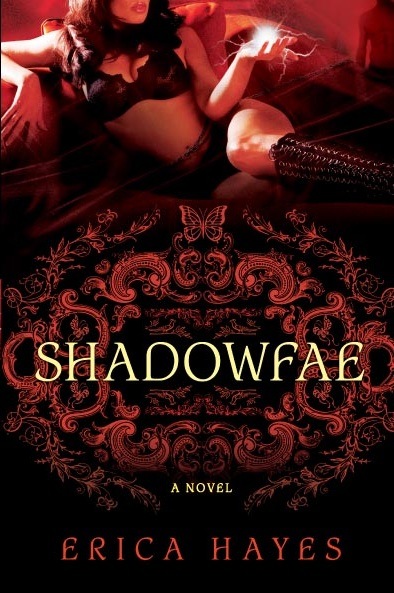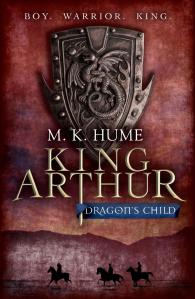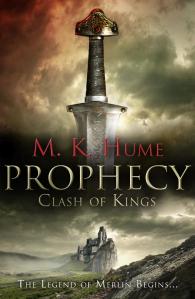 Q: First congratulations on the success of Gladiatrix. I feel like a proud big sister because I organised the pitching opportunity at the 2006 National SF Con, which led (eventually) to your sale. (Rhonda talks about this experience on the ROR blog). Since your sale what have you learnt about the publishing industry that you wish you could have told yourself back then?
Q: First congratulations on the success of Gladiatrix. I feel like a proud big sister because I organised the pitching opportunity at the 2006 National SF Con, which led (eventually) to your sale. (Rhonda talks about this experience on the ROR blog). Since your sale what have you learnt about the publishing industry that you wish you could have told yourself back then?
Thanks Rowena, that pitching opportunity changed everything!
One key lesson is that you need to acquire publicity skills asap. In the standard contract you are legally required to help publicise the book. My experience has been that publishers try to work with you on this – so make choices now rather than later. Different publicity methods suit different books and, more importantly, different authors. The key thing is to go with your strong points.
If public speaking is your strength – then find ways to use that. Your publisher can help you make contacts and set up interviews etc. If, like many authors, you’d rather concentrate on the web – then work out which of the available options suit you and how you want to invest your non-writing time.
Whatever venues you choose, make sure you can sum up your book in 7, 30, and 100 words. That will save you a few uncomfortable silences while you try to compress your magnum opus into a bite size chunk and still do it an iota of justice.
Q: I like the look of your web site, Rhonda, very noir, very suitable for a time travelling detective. Do you have a background in graphic design?
That’s great to hear, thanks!
I do have a distant background in art but my husband, Richard Caladine, did all the artwork on the website, as well as the maps that go with the books. We work closely together on these projects, but he does the final images. He’s in the communication technology industry as well as being a talented artist with his own website.
I love all things noir and have spent a lot of time developing that kind of look and feel in the series. The second book, Hoodwink, is set in Hollywood in 1939 specifically because this is my hero’s first real case as a private investigator. So, of course, she had to go back to the era of The Maltese Falcon and the hard-boiled private eye.
If you like the website now, check again towards the end of this year, Hoodwink comes out in January 2012 and there’ll be some changes and additions to celebrate the launch. J
 Q: I see Gladiatrix was nominated for the Norma K Hemming Award. This award celebrates excellence in the exploration of race, gender, class and sexuality. This must have been a thrill. Did you set out to explore this themes, or did it just arise naturally?
Q: I see Gladiatrix was nominated for the Norma K Hemming Award. This award celebrates excellence in the exploration of race, gender, class and sexuality. This must have been a thrill. Did you set out to explore this themes, or did it just arise naturally?
Oh yeah, I certainly was thrilled to be nominated! Gladiatrix was my first book and I had no idea whether anyone would even read it. 🙂
Gladiatrix isn’t, by any stretch of the imagination, a sermon – it’s high adventure – but my politics tend to be inclusive rather than exclusive, so I guess they seep into everything.
Q: Gladiatrix was also nominated for the Davitt Award. This award is sponsored by the Sisters in Crime Australia for the best crime novel by an Australian woman. It looks like you are spanning at least two genres. Have you always been a fan of crime and mystery?
Sisters in Crime is such a wonderful organisation – I was absolutely thrilled they liked it.
Why did I venture across genres? Human history is full of deep dark mysteries and many of them involve unsolved crimes, so following a time travelling detective opens up adventures in any conceivable time or place. When you throw a slightly alternate past and present into the mix, then the adventure gets really exciting because anything can happen – and frequently does. J
Have I always been a fan of crime and mystery? On and off. Then one hot, sweaty summer – when I was bored and desperate for something new – I ended up in the crime section, where I discovered the V.I. Warshawski series by Sara Paretsky. V.I. is not only a smart, tough detective in the old school, noir tradition, but is also a compassionate modern woman. What a combination! I was hooked.
Since then I’ve discovered that noir female characters are very exciting people. You never quite know what they’re going to do next – but you can be damned sure you want to stick around and watch.
 Q: Your main character, Kannon Dupree is described as feisty and bit impetuous but smart enough to get herself out of dangerous situations. Did you find that your background in martial arts helped you write realistic fight scenes?
Q: Your main character, Kannon Dupree is described as feisty and bit impetuous but smart enough to get herself out of dangerous situations. Did you find that your background in martial arts helped you write realistic fight scenes?
Oh definitely. Especially the injuries incurred side of it. J (I’m rubbing my knee with one hand as I type with the other.)
Q: You PHD and work as an academic specialising in knowledge systems in different cultures and historical periods must help you create realistic settings when your main character travels through time. What advice could you give aspiring writers on research?
It depends on what kind of book you’re researching but if you’re writing about ‘a stranger in a strange land’, I’d suggest you start with what’s the same and what’s different? Then ask yourself why is it so?
Find out what your characters need to operate on a daily basis. Then go on to what belief system is dominant. Is it religious, scientific etc…? How does the power structure operate? Gender/class/ethnic relations? What does their technology look like and how does it fit into the socio-economy? Then the more psychological components come in. What is the family unit like? What are their greatest fears? How do they relax? And so forth…
Q: You grew up in Western Australia and spent your holidays rambling around the old gold rush ghost towns. Will there be a Kannon Dupree time travel mystery set against this background?
The series will regularly return to an Australian setting – that will definitely happen.
Choosing what era to visit next takes a bit of planning. There’s a particular arc going on with the main character that is suited to certain eras, so that has to be catered for. Plus some stories come roaring out of my filing cabinet and gleefully hijack the process…
Both of which happened with my second and third books. Hoodwink, (due out in January 2012) is set in Hollywood in 1939. So Kannon can put on her black trench coat and sunglasses, and slink around noir paradise.
The third book, which I’m now in the process of finishing, comes out later in 2012. I can’t tell you what it’s about yet, as my editor has a sniper ready to fire a warning shot if I mention it too soon. J
Q: I was prompted to start this series of interviews because there seems to be a perception in the US and the UK that fantasy is a bit of a boy’s club. Do you think there’s a difference in the way males and females write fantasy?
Really? But what about J.K. Rowling, Ursula Le Guin, Anne Rice and the million other stunningly wonderful female writers over there? What’s going on?
Sure gender can influence writing choices, just as ethnicity, religion, class, age, breadth of life experience, political beliefs etc, etc, can too. But what’s wrong with that? Does anyone still seriously believe diversity isn’t a good thing? The point is on what basis worth is judged…what is valued, which voices are listened to and which ones are denigrated or dismissed.
 Q: Following on from that, does the gender of the writer change your expectations when you pick up their book?
Q: Following on from that, does the gender of the writer change your expectations when you pick up their book?
Like many fantasy authors, there’s always been a special place in my heart for books – whatever the genre, whoever the author – that show off the might of the human spirit and it’s awesome potential. We need more of those books not less…
At the moment I’m besotted by John Carlin’s book on Nelson Mandela. How Mandela overcame the shackles placed on him because of his colour and basically saved South Africa from genocide. Talk about a true-life fantasy story!
So, I will happily pick-up books with any gender combination of author and subject. But…I won’t buy misogynistic books or ones that treat their female characters like convenient wallpaper – whatever the author’s gender.
Q: And here’s the fun question. If you could book a trip on a time machine, where and when would you go, and why?
My two dogs are wondering why I’m laughing… There are so many possibilities! What was Joan of Arc really like? What secrets are encoded in the Voynich manuscript? What were Buddha’s last words? What was written on the Mayan codices destroyed by the Conquistadors?
But this month the answer is: to the VIP seats at the Rugby World Cup Final, Johannesburg, 1995, and in the limo that took President Mandela back home from the game.
This is the day (a fraction of which is portrayed in the film Invictus) that it became clear that Nelson Mandela had managed to divert the South African nation away from a bloody civil war – when blacks and whites alike celebrated the Springboks’ World Cup victory. I’d dearly love to watch Nelson Mandela’s face as he saw HIS people, the South African nation, share the same emotion at the same time – joy.
Give-away Question: In the last Census there were 58,053 Jedi Knights listed in Australia. What new religion would you propose for the next one? Why? What would they do and wear? How would you spread it? (Get on to merchandising if you feel that is appropriate.)








